In every London home, hot water is a basic necessity – whether it’s for bathing, washing dishes or doing laundry. But with rising energy prices, choosing the most cost-effective and energy-efficient way to heat water is more important than ever. Many homeowners ask: is it cheaper to use a boiler or immersion heater?
This is a common question across the UK, especially in cities like London where both options are widely used. Boilers often run on gas and heat water quickly through the central heating system. Immersion heaters, on the other hand, run on electricity and heat water stored in a hot water cylinder – these can be turned on and off as needed.
But which one saves you more money in the long run?
In this blog, we’ll compare the cost of boilers vs immersion heaters, including installation, energy use, maintenance and real-life use cases. We’ll also explore how energy charges, smart controls and off-peak electricity schemes such as Economy 7 can affect your bills.
Whether you’re a landlord, homeowner or tenant, this guide will help you decide the cheapest way to heat water in London based on your needs.
🔗 For the latest UK energy prices and tariffs, visit Ofgem’s website.
🔗 Learn more about Economy 7 tariffs on British Gas.
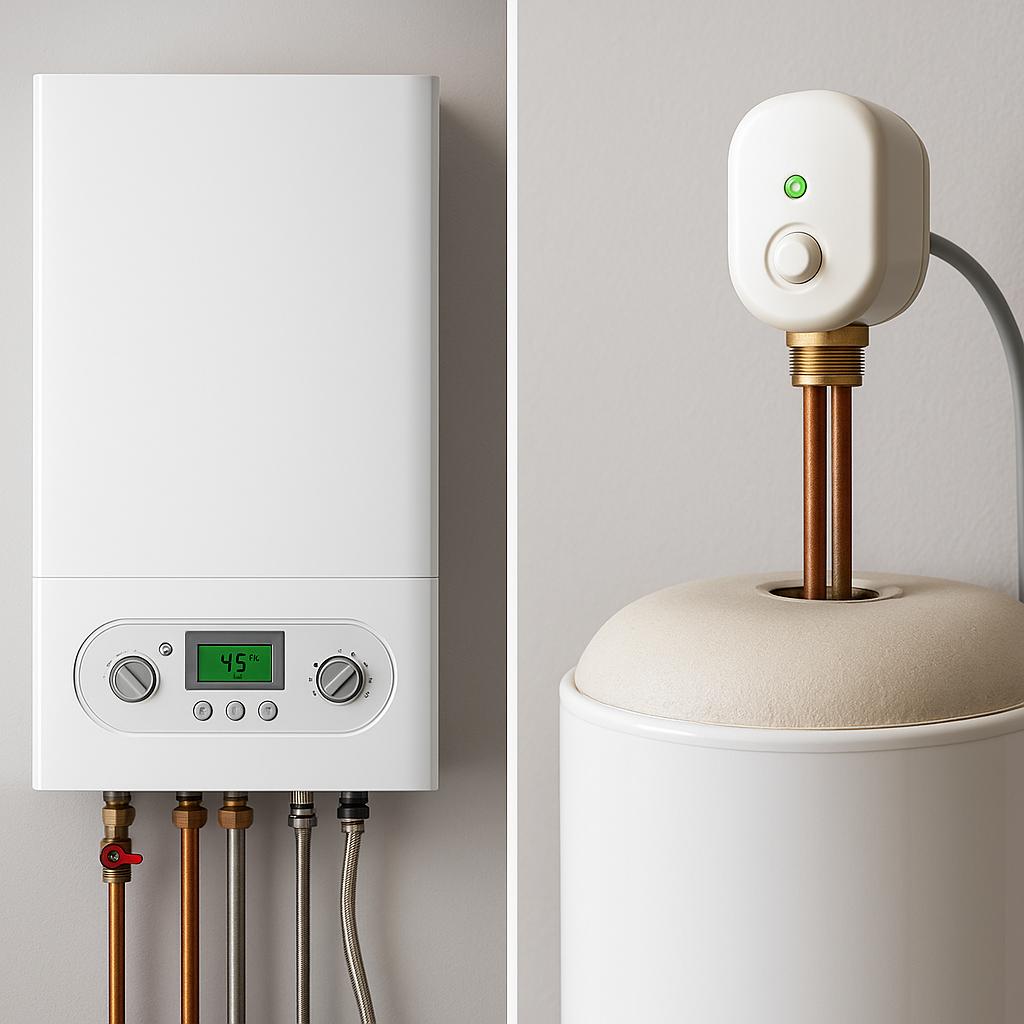
Understanding the Basics: Boiler vs Immersion Heater in London
1.1 What is a Boiler System?
A boiler is a heating system that uses gas (or sometimes oil or electricity) to heat water. This hot water is then used to power showers, taps and central heating (such as radiators). Most homes in London use gas boilers because they are quick and cost effective.
There are three main types of boiler in the UK:
- Combi boiler – provides hot water and heating directly, no need for a water tank. Best for small homes.
- System boiler – uses a hot water cylinder. Good for homes with multiple bathrooms.
- Regular boiler – also called a traditional boiler. Needs both a cylinder and a cold water tank. Suitable for large homes.
💷 Cost to install: £1,500–£3,000
💡 Running cost: Lower if you’re on a gas tariff
🔗 Learn more about boiler types from Energy Saving Trust
1.2 What is an Immersion Heater?
An immersion heater is an electric device that is fitted inside a hot water tank. It works like a large kettle – heating the water slowly over time. You can turn it on and off as needed, which is useful for backup or if you’re using an Economy 7 electricity tariff.
These are common in homes without a gas supply or used as a backup water heater.
💷 Cost to install: £300–£600
💡 Running cost: Higher if used during peak hours, cheaper during off-peak (Economy 7)
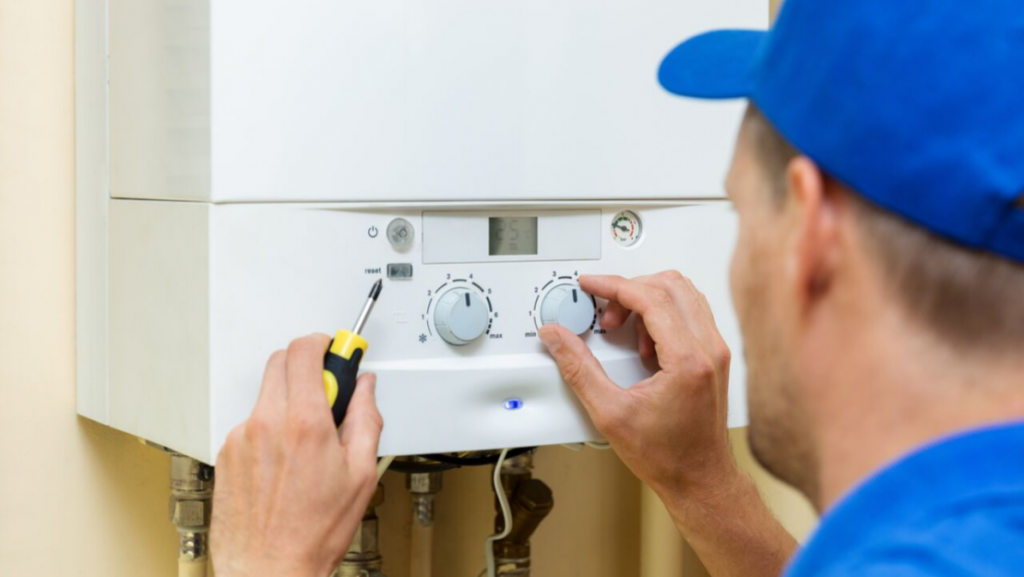
Cost Comparison – Boiler vs Immersion Heater in London
2.1 Running Costs: How Much Does It Cost to Heat Water?
Let’s compare the cost of heating 100 litres of water with a boiler and an immersion heater.
- Gas Boiler: Gas is usually cheaper than electricity. On average, it costs around 4-5p per kWh. To heat 100L of water, a gas boiler might use about 5–7 kWh, which equals 20–35p.
- Immersion Heater: Electricity is more expensive. It usually costs about 24–30p per kWh. Heating the same 100L of water can cost £1.20–£2.10.
👉 Based on energy rates from Ofgem (UK’s energy regulator), gas is more cost-effective for regular water heating.
2.2 Installation & Maintenance Costs
Gas Boiler: Installation can cost between £1,500–£3,000 depending on the type (combi, system, or regular). Annual servicing is also needed (around £80–£120).
Immersion Heater: Installation is simpler and cheaper — usually £300–£600. Maintenance is minimal, but replacing a heating element may cost £100–£200.
2.3 Tariffs and Timing: Smart Ways to Save
- If you’re on an Economy 7 or Economy 10 tariff, you can run your immersion heater at night, when electricity is cheaper. This can reduce your costs significantly.
- Boilers can be paired with smart thermostats and timers, letting you control usage more efficiently.
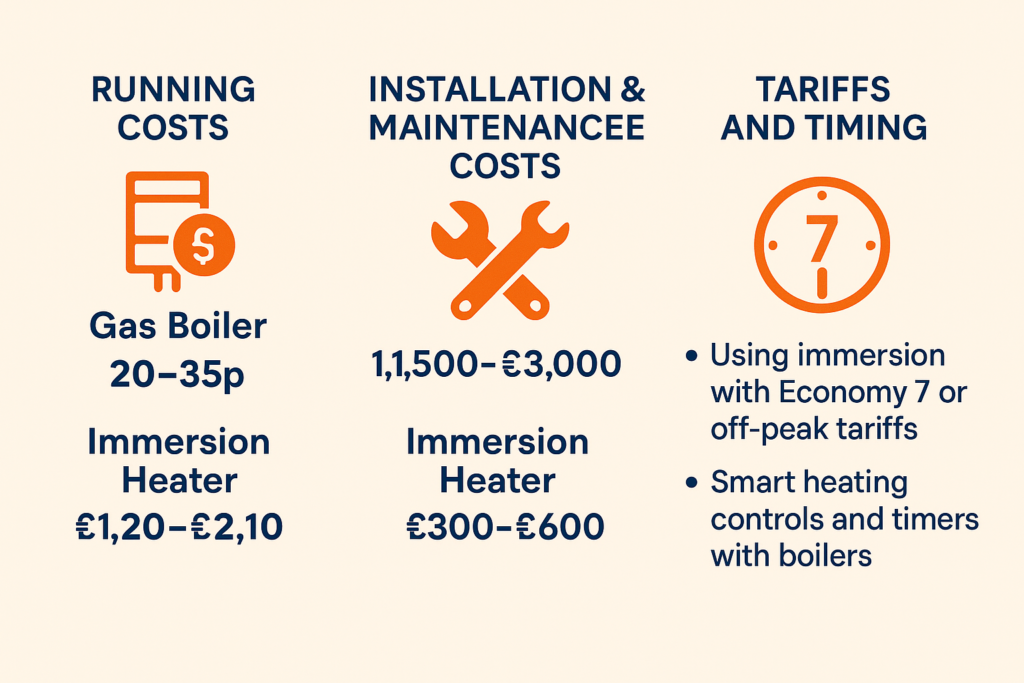
Energy Efficiency and Environmental Impact – Boiler vs Immersion Heater
When choosing between a boiler and an immersion heater for heating water, it’s not just about cost – energy efficiency and environmental impact matter too. Let’s compare how each performs.
🔥 Boiler efficiency (especially modern condensing boilers)
Modern gas condensing boilers are designed to be highly efficient – most models are 90% or more efficient. This means they use less energy to heat water and waste a lot less. However, because gas is a fossil fuel, it produces carbon emissions, which contribute to climate change.
💡 If your home in London already has a gas boiler, upgrading to a condensing model could reduce both bills and carbon emissions.
🔗 Read more about boiler efficiency from Energy Saving Trust
⚡ Immersion Heaters: Power Source Matters
Immersion heaters use electricity to heat water. In terms of cost, they are less efficient than a gas boiler per se. However, the environmental impact depends on how that electricity is generated.
- If your electricity comes from renewable sources (such as wind or solar), the carbon footprint is much lower.
- If your electricity comes from coal or gas, the environmental impact is higher – similar to or worse than a gas boiler.
🧮 Carbon Footprint Comparison
- Gas boilers produce CO₂ directly.
- Immersion heaters are only low-carbon if powered by green energy.
✅ Verdict: Boilers are energy-efficient but not eco-friendly unless paired with carbon offsetting. Immersion heaters can be greener if you use renewable electricity.
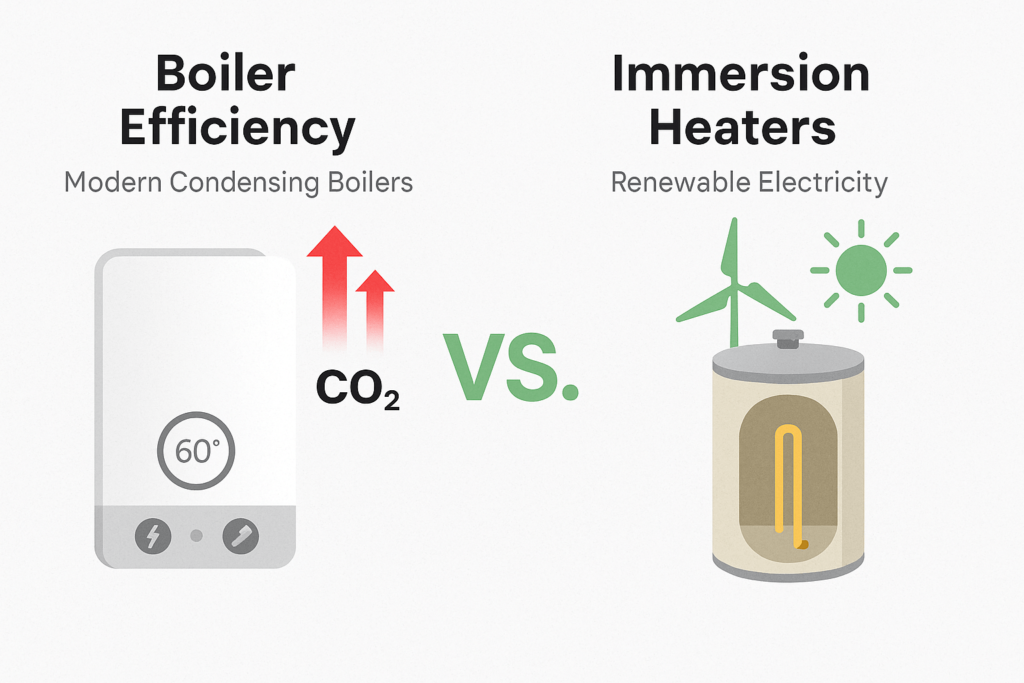
Practical Use Cases: When to Use a Boiler or an Immersion Heater in London Homes
Choosing between a boiler and an immersion heater depends on the size of your home, lifestyle and how often you need hot water.
👨👩👧👦 Best choice for families
For families or shared households, a gas boiler is usually the best choice. It heats water quickly and allows multiple people to use hot water at the same time. For example, a combi boiler gives instant hot water without the need for a storage tank. This makes it both convenient and cost-effective for everyday use.
👤 Best Option for Single-Person Households
If you live alone and only need hot water for a short shower or some dishes, an immersion heater can be more efficient — especially if you have an Economy 7 or off-peak electricity tariff. You can heat a small amount of water at night when electricity is cheaper and turn it off when not needed.
🏡 When Immersion Heaters Are Ideal
Immersion heaters are also great for backup heating, second homes, or properties that don’t have access to mains gas. You can switch them on manually or use a timer when hot water is needed.
💷 When Boilers Are More Economical
If you use hot water regularly throughout the day, a boiler is more economical in the long run. Gas is cheaper than electricity in most UK households, making boilers a better option for high-usage homes.
💡 Expert Tips to Save on Water Heating Bills in London Homes
Whether you use a boiler or an immersion heater, you can cut your water heating bills by making some smart changes at home. These simple tips can save money and energy – especially as electricity prices continue to rise in the UK.
🛁 1. Insulate Your Hot Water Tank
If you have a hot water cylinder, fitting an insulation jacket keeps the water hot for longer. This means your boiler or immersion heater won’t need to work as often, saving energy and money.
- A tank insulation jacket costs around £20–£30
- This could save you up to £50 a year on bills
⏲️ 2. Use Thermostats and Timers
Install a thermostat to control the temperature of your hot water system. Set it to 60°C, which is hot enough for daily use but not wasteful. Plus, using a timer ensures your water is only hot when you need it – such as in the morning or evening.
- Smart thermostats help you heat water only when it’s needed
- Timers are especially useful with the Economy 7 tariff
🚿 3. Fix Dripping Taps & Use Water-Saving Showerheads
A dripping hot water tap wastes both water and heating energy. Fix leaks quickly and use low-flow showerheads to cut hot water usage without sacrificing water pressure.
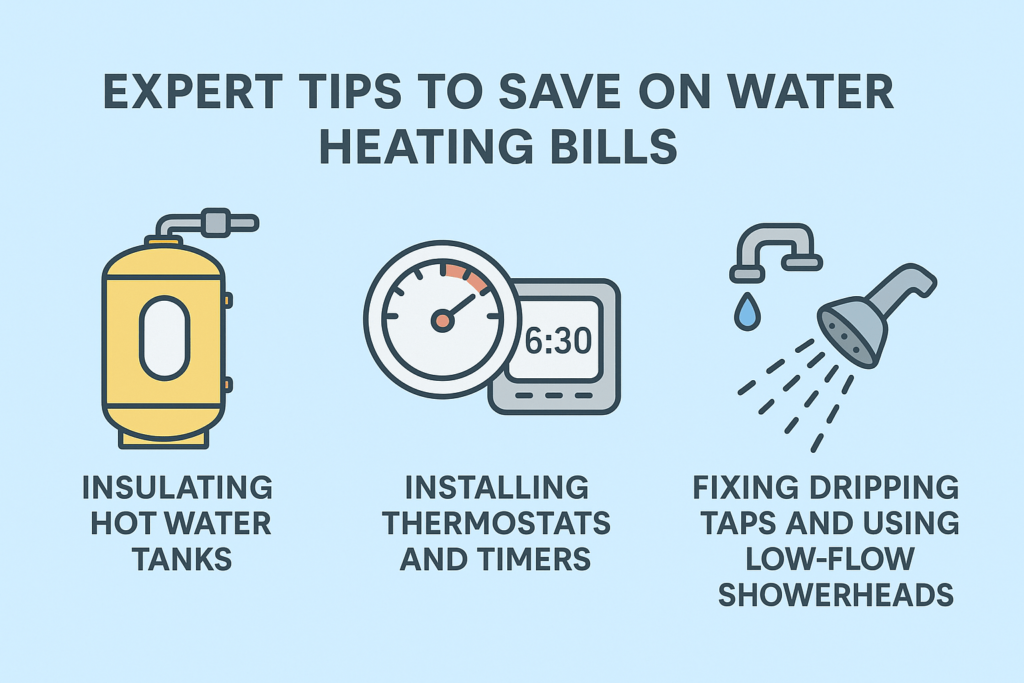
Conclusion: Which Is the Cheapest Way to Heat Water in London – Boiler or Immersion Heater?
So, what’s the final answer to the big question: Is a boiler or an immersion heater cheaper for heating water in London?
Based on cost and energy efficiency:
- Gas boilers are generally cheaper to run. Gas costs less per unit (kWh) than electricity, making boilers the best choice for families or homes with high hot water usage.
- Immersion heaters cost more to run on electricity, but they can be cost-effective in specific situations — such as for single-person households, backup use, or homes on Economy 7 or off-peak electricity tariffs.
💡 Tip: If you already have both systems, consider a hybrid approach:
- Use your boiler for regular, daily use.
- Use the immersion heater during off-peak hours or in summer when you don’t need heating.
This smart mix can save energy and lower your bills over time.
| Factor | Gas Boiler | Immersion Heater |
| Running Cost | ✅ Lower | ❌ Higher |
| Installation | ❌ Higher | ✅ Lower |
| Best For | Families, daily use | Singles, backup use |
| Energy Source | Gas (non-renewable) | Electricity (can be green) |
Frequently Asked Questions – Boiler vs Immersion Heater in London Homes
Q1 Can I use both a boiler and immersion heater together?
Yes, you can use both — and many UK homes already do. The boiler is usually the main system for heating water and central heating. The immersion heater works as a backup, especially useful if the boiler breaks down or needs servicing. You can switch it on manually or set it on a timer to use only when needed.
Q2. Are immersion heaters safe to leave on overnight?
Yes, they are generally safe if installed correctly and well-maintained. However, leaving them on all night can waste electricity if you don’t have an Economy 7 or off-peak tariff. To save money and energy, use a timer to switch the immersion heater off automatically after the water is heated.
Q3. How long does it take to heat water using each method?
- A gas boiler can heat water in about 20–30 minutes for a full tank or instantly if it’s a combi boiler.
- An immersion heater takes longer — usually around 60–90 minutes to heat 100 litres of water, depending on the power rating (typically 3kW).
👉 Using a well-insulated tank helps keep the water hot longer, reducing how often you need to reheat it.
Also read – How Much Does an Electric Boiler Cost in the London? A Complete Guide for 2025

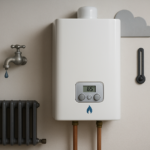
Pingback: What Size Combi Boiler Do You Need? A Simple Guide for UK & London Homeowners (2025) - KYB
This is such a timely topic, especially with energy prices skyrocketing! I’ve always wondered if boilers are truly more economical than immersion heaters in the long run. Your comparison covers installation costs and energy use, but what about the environmental impact? Does one option significantly reduce carbon emissions more than the other? Also, how do smart controls factor into the overall savings? I’d love to hear more about real-life experiences – do you have any examples of households switching from one system to another and seeing noticeable changes in their bills? Lastly, for renters like me, is it even worth trying to influence the landlord’s decision, or should we just stick to what’s already installed? Would love your thoughts!